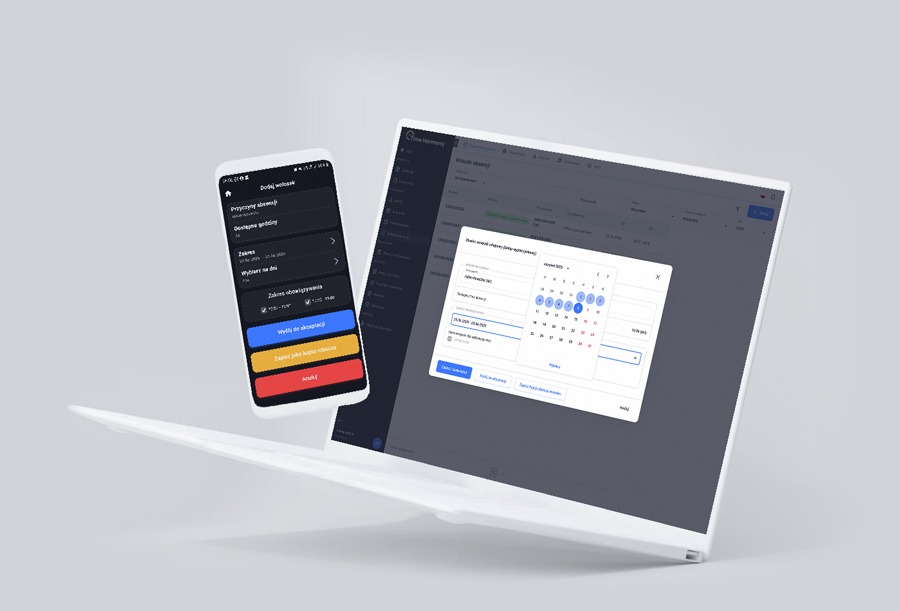Seasonal worker management is one of the biggest challenges faced by companies operating in seasonal cycles. Increased demand for work in certain periods – e.g. in trade, logistics, tourism or agriculture – forces the employment of additional staff, often in a short period of time. Such a situation is associated with a number of problems: from planning schedules and settling working time, through efficiency assessment, to compliance with labor law regulations.
The Time Harmony system comes to the rescue, supporting both daily HR processes and strategic management of seasonal employees based on data from previous seasons
1. Seasonal working time records – safe, compliant and automatic
One of the most common problems in the area of seasonal work is keeping records of working time. Although seasonal workers are employed on various legal grounds (employment contracts, mandates, contracts for specific work), the obligation to record their working time still rests with the employer (Article 149 of the Labour Code). Time Harmony eliminates errors and delays resulting from manual time recording. The system registers attendance using T&A cards, a mobile application or biometric terminals. Your employer has instant access to real-world data: start and end times, breaks, lateness, and overtime – all of which are essential for accurate payroll and compliance.
2. Seasonal worker efficiency under control
In the case of seasonal workers, the challenge is to quickly assess their effectiveness. The short period of employment and the limited onboarding time make it difficult to assess whether a person is actually contributing to operational objectives. Time Harmony allows you to manage your seasonal workforce by accurately measuring the activities performed and performance. Each activity – e.g. order picking, packing or loading – can be assigned to an employee and measured over time. On this basis, an objective performance report is created, which can be used to make personnel decisions or for bonuses.
3. Work planning based on data from previous seasons
One of the biggest advantages of Time Harmony in the context of managing seasonal employees is the ability to use historical data. The system collects operational data from each season, enabling the analysis of trends, workload and staffing needs. On this basis, it is possible to accurately plan the number of employees needed in the same period – minimizing the risk of a shortage of workforce or overemployment. Data from previous years shows not only the number of hours worked, but also the effectiveness of teams and the occurrence of bottlenecks in processes.
As a result, managing seasonal workers is no longer a guessing game and becomes a predictable and fact-based planning process.
4. Settlement of seasonal employees – without errors and delays
In the case of seasonal work, salary settlements are often carried out under time pressure and with high staff turnover. Manual transcription of attendance list data into HR and payroll systems generates errors that can result in employee claims or sanctions from control institutions.
Time Harmony automates this process. Based on the recorded working time, reports are generated ready for export to the payroll system. This makes settlements fast, reliable and consistent with actual data. This is especially important in seasonal work, where every mistake costs money – directly and in terms of image.
5. Seasonal operational performance analysis
In the long run, Time Harmony allows not only to account for work, but also for strategic analysis of operational efficiency on a seasonal basis. The ability to compare data from different years allows you to evaluate the effectiveness of your operations, identify patterns and plan future seasons with greater precision.
In practice, this means that the management of seasonal workers can be optimized from year to year – by learning from year to year, improving processes and better preparing for the next periods of intense work.
Key benefits of implementing Time Harmony in seasonal work:
-
- Full control over the working time of seasonal employees
- Automation of settlements and compliance with the Labor Code
- Data-driven performance evaluation of seasonal workers
- Better schedule planning thanks to the analysis of data from previous seasons
- Reduce operating costs and avoid HR errors
- Scalability of the system regardless of the number of seasonal employees
Seasonal worker management - summary
Managing seasonal workers requires flexibility, precision and quick response to changing conditions. Traditional methods – based on manual planning and accounting – do not work in the reality of a dynamic market. Time Harmony is a tool that allows you to control the process of seasonal work – from time tracking, through efficiency control, to planning future activities.
The implementation of the Time Harmony system not only saves time and money, but also increases legal security and better organization of work. For companies using the seasonal employment model, it is an investment that translates into specific operational and strategic benefits.
Are you wondering how to improve the management of seasonal employees in your company? Contact us and see how Time Harmony can adapt to your seasonal work model.

Easily manage your company's working time

